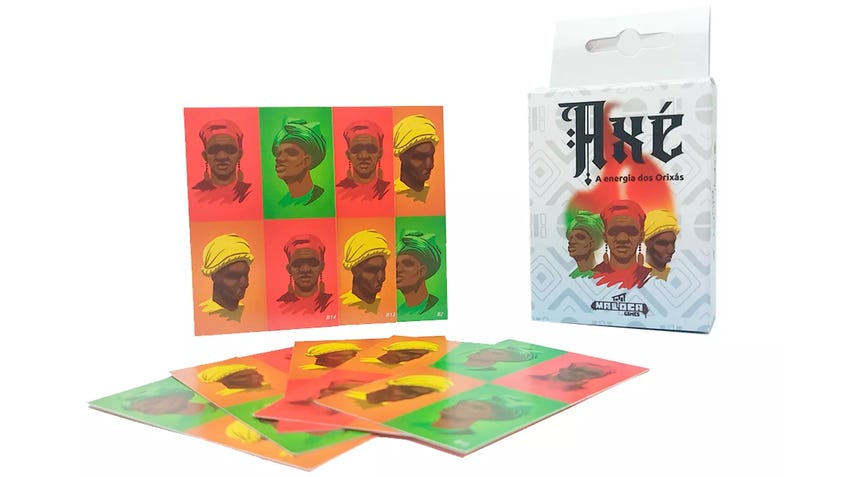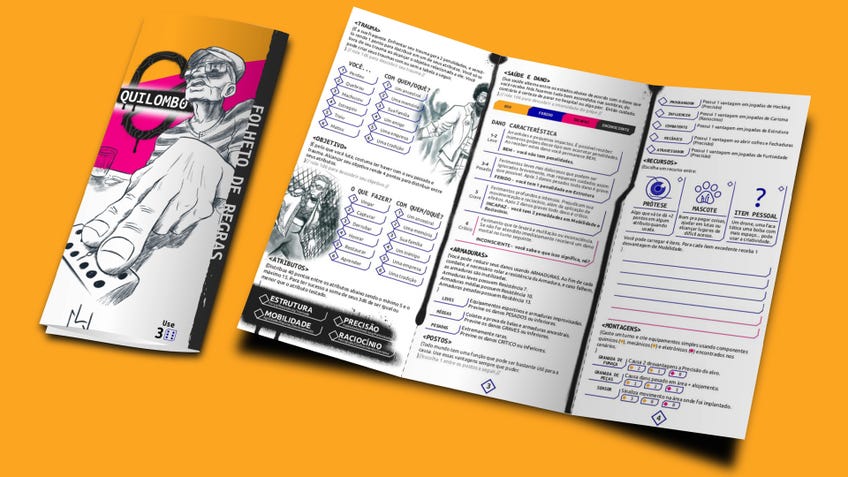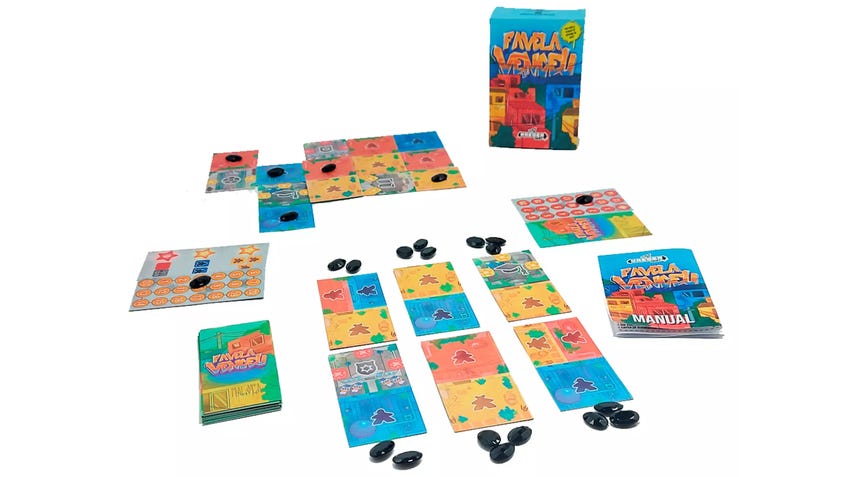Brazilian board game creators are giving the country’s voiceless a way to be heard
Local designers and publishers are incorporating the stories and cultures of favelas and other Brazilian communities into their own games.
There is a global collective image of Brazil that imagines the nation in stereotypical ways - from a constellation of dilapidated favelas in its cities or the starkly contrasted verdant bounty of the Indigenous-inhabited Amazon rainforest to the glory of its five-time FIFA World Cup-winning national football team. Yet Brazil is more than these things. While it is easy to evoke the sensory experiences of its world-famous carnival parties, the sounds of samba and bossa nova music, or the streets seen in evocative films like City of God, real-life Brazil is much more complex. While there are indeed favelas, Indigenous villages and other impoverished areas, even these enclaves hide different versions of Brazil that have made important contributions to its larger culture - including through board games.
Brazilian studio Maloca Games was formed by impoverished Brazilians hailing from different disenfranchised groups. CEO Rennan Gonçalves recalls how the experience of North American tabletop convention Gen Con in 2020 brought together “many Black people that were part of this universe, who organised to form their own projects hailing from digital games, RPGs, tabletop games and others”. The two attending members of the studio were later joined by a further two creators.
“Maloca Games came from that gathering, uniting our passion for gaming and our desire to develop a representation of our culture and reality,” Gonçalves recalls. “We wanted games that dialogue directly with our people. So, four Black and ghetto people who dedicate themselves to gaming gathered to make this dream come true.
“However, there was the need to create a segment to classify those projects that, in their essence, diverged from those offered in the mainstream industry,” Gonçalves continues, referring to the creation of African-centred digital and analogue games: “That is how Afrogames came to be.”
Gonçalves’ studio has soared over the last year as the result of participating in Brazilian conventions such as Perifacon, Diversão Offline and ExpoFavela, alongside releasing more games into the market. Maloca Games was founded in the second part of 2022; the following year it released four games. The expectation for 2024 is to have eight more games in their catalogue, having already sold thousands of copies and donating a further 500 to impoverished Brazilian neighbourhoods.
The high prices of board games hinder impoverished communities' access to more expensive and complex games.
The word ‘maloca’ describes ancestral long houses inhabited by Indigenous peoples from the Amazon, mainly from Colombia and Brazil. They also house several families with patrilineal ties under the same roof, protecting their community and identities. Maloca is also a slang term used for favela houses. Residents of favela houses live on the fringes of Brazil, one of the most socially unequal countries in the globe. The tabletop gaming hobby also reflects this inequality.
Brazilian geek culture journalist Gabriela Franco tells Dicebreaker that tabletop gaming culture in the country “could [be] better, as it is a not-so-much explored market when comparing to Europe and the USA”, but proposes that “among the Latin American countries, Brazil is on top when it comes to playing board games”. Per the Brazilian Association of Toy Manufacturers (Abrinq), in 2021 more than £1.2 billion was generated by board games, tabletop RPGs, puzzles and card games, 4% more than the previous year. According to Game Brasil Research, in 2019 at least 28% of the Brazilian populace played board games.

Franco acknowledges the role of social class in Brazilians’ enjoyment of games. The cost of board games can be prohibitive for those who lack financial means, with some games costing as much as £160 when the Brazilian monthly minimum wage hovers at £223. On top of the higher cost of their production, board games are subject to import taxes, inflation and licensing fees. Public places to play, such as board game cafes, can offer a more accessible way to enjoy the hobby, but physical gaming spaces are rare.
“Some games are out of the reality of ordinary Brazilians,” Franco says, adding that many players tend towards card games due to their lower cost and greater accessibility. “The high prices [of board games] hinder impoverished communities' access to more expensive and complex games.”
Games can cost as much as £160 when the Brazilian monthly minimum wage hovers at £223.
Andreza Delgado, co-creator and organiser of ‘favela nerd convention’ Perifacon, agrees that socioeconomic background, combined with racial prejudice, affects many Brazilians’ ability to participate in tabletop gaming: “There is a large gap caused by social class - and, in Brazil, ‘social class’ points to ‘race’.”
Social class and race aren’t the only prejudices that tabletop gaming must overcome, Delgado adds. “Board gaming sees even more obstacles because ludic activities are perceived as superfluous, and there is also the matter of chronological age - as once you start becoming an adult, there is the speech that you can't play games anymore because ‘it is a child thing’.”

Maloca Games still faces an uphill battle despite its success. According to Franco, there has been greater investment from tabletop publishers for games both created in and themed around Brazil, with greater representation of its cultures as a result, but there remains a lot of room for improvement. Franco believes that the majority of Brazilian players still prefer imported games, with diversity and accurate depiction of Brazil’s reality less of a concern for more established developers.
“We still have little representation in gaming publishing houses, especially in creative and leading sections,” she says, arguing for improved diversity inside relevant Brazilian companies and the rooms where these games are being created. “[The industry] lacks women, Black and Indigenous peoples, among other minorities, acting as consultants in pertaining matters but mostly leading those businesses. It is a generalised issue in the Brazilian pop-culture market, which is extremely White-masculine and misogynist.” However, “some independent publishing houses are struggling to change this reality”.
The tabletop gaming industry lacks women, Black and Indigenous peoples, among other minorities, acting as consultants in pertaining matters but mostly leading those businesses.
Maloca’s own games exemplify the representation Franco feels is absent from many games. The card game Axé: A Energia dos Orixás (Axé: The Orishas Energy) features deities, such as Ogun and Shango, based on the pantheon of the West African Yoruba people, who have a notable diaspora in Brazil. Extensions of the African religions that worship these deities are also represented in places such as Cuba, Haiti and New Orleans. (The co-protagonist of the animated series Castlevania Nocturne, Annette, recently brought the culture to a wider audience.)
Favela Venceu (The Favela Has Won) further incorporates aspects of diversity and consideration of social issues. Players must construct favelas capable of providing safe structure and humane living conditions in these often impoverished and improvised households.

In Brazil, it was estimated in 2019 that more than five million households are distributed across 13 thousand favelas, located in 734 cities; among them the Federal District. These areas endure statal absence and are a living narrative that permeates not only Gonçalves’ games but his own story. The Favela Has Won was based on the designers’ collective experience. By observing the daily routines of the favelas, they wanted a game that would highlight the lighter characteristics and the resilience of these communities: “The feedback from favela inhabitants has been extremely positive, as we are talking about a dream that is still under construction: a favela that has overcome the odds.”
The title of tabletop RPG Quilombo Zero was inspired by the communities formed by formerly enslaved people that escaped bondage. The game takes place in a favela in a future where ancestral lore has recreated the society after a great environmental disaster. The players are part of a hacking group named Quilombo Zero, tasked with helping the favela inhabitants. The RPG is aimed at roleplaying newcomers, but can entertain veterans too.
We are here building bridges, so people can cross.
Gonçalves describes the influence of Afro-Brazilian, Indigenous, LGBTQ+ and favela cultures in Maloca’s games as “fundamental to making our games authentic, representative and inclusive”. As well as being games for players to enjoy, Delgado believes that titles represent “an important educational work” for those outside of those communities: “'Everyone wins with diversity.”
“We are here building bridges, so people can cross,” Delgado says. “I truly believe in Maloca's potential to educate through gaming.”
With the emergence of studios such as Maloca Games, tabletop gaming in Brazil is increasingly serving as a beacon of representation that brings together those across different social classes, cultures and countries. Maloca Games is both a landmark in representing the country’s favelas in the industry and at the table where games are played.

